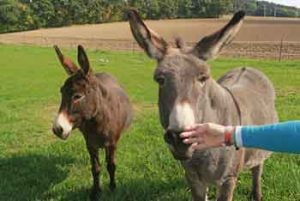Latham Centers offers unique program for kids with Prader-Willi Syndrome
 Most people have heard of equine therapy, but the term asinotherapy probably would draw many blank stares. Originally developed in Germany, this lesser-known therapy is actually a successful program that uses miniature donkeys.
Most people have heard of equine therapy, but the term asinotherapy probably would draw many blank stares. Originally developed in Germany, this lesser-known therapy is actually a successful program that uses miniature donkeys.
Since 2009, it’s been an integral part of Latham Centers, a residential care, education, and treatment center for children and adults with Prader-Willi Syndrome on Cape Cod.
Prader-Willi Syndrome (PWS) is a complex genetic disorder that affects one in 12,000 to 15,000 births. It is characterized by an insatiable appetite, developmental disabilities, skin picking, and emotional and behavioral problems.
“PWS is a spectrum disorder,” said Patrice Carroll, LCSW, director of PWS services at Latham Centers. “Some kids describe feeling like they never get full, and will overeat if food is around. But they won’t go out of their way to get it.”
Other children will “steal money, run away to get food, and eat raw or rotten food,” she said.
Some individuals with PWS are of typical intelligence to their peers, attend college, drive, and have long-term relationships, Carroll said.
Others have much lower IQs and need 24-hour support.
However, intelligence isn’t correlated with condition. Carroll noted that children with average intelligence may have more challenges.
According to Carroll, donkeys work better than horses with students at Latham Centers because the animals are smaller and calmer. Students who participate in asinotherapy must pass a six-week training on caring for the donkeys and approaching them safely.
Then, students work with the donkeys weekly, grooming and feeding them and cleaning up their pen for about an hour.
The biggest benefit for students with PWS is the improvement in impulse control, Carroll said. Children with PWS don’t consider the consequences. But “when working with donkeys, students have to think through, ‘If I do this, they’re going to do that.’”
The interaction prompts students to “use the power of their own calmness,” and gain the donkeys’ trust, she said. If they do something quickly or unexpectedly, the donkeys will lash out, kick, walk away, or yell loudly.
“You can’t force donkeys to do something they don’t want to do,” which fosters greater patience, said Anne McManus, president of Latham Centers.
Asinotherapy is motivating, she said. McManus described a particularly difficult case with a student who wasn’t interested in anything. “When the donkeys came on the scene, she was delighted. It was a turning point for her.” She started getting up, getting dressed and was ready to work.
“It was a stepping stone for other activities.”
Asinotherapy also strengthens students’ self-esteem, confidence, and their ability to empathize and build relationships, Carroll said.
“Over time, you see a certain donkey bonding with a certain child,” she said. The donkey might follow the child around the pen, nudge them with their nose, and be very vocal and excited to see them.”
Carroll believes people often hyper-focus on the challenges of PWS and discount the positives—a much longer list. Individuals with PWS tend to be extremely engaging, funny, and empathetic, she said.
“We focus on the good list, and we shorten the list of challenges, and the donkey program is one of the ways that’s helped us do that.”
PWS isn’t characterized as an anxiety disorder, but it’s a better way of understanding it, Carroll noted. People with PWS have “high anxiety just about everything.”
Environment is critical. In an anxiety-provoking environment—unpredictable schedules, many transitions—kids can be aggressive. They’re “compelled to act out because their anxiety takes over.”
“When their anxiety is decreased, kids with PWS can be extremely successful in school, work, and relationships,” Carroll said. This success can happen for kids with the most challenging behaviors, many of whom make friends for the first time in their lives.
“Really, it’s the environment that defines how successful the individual will be,” Carroll said.
Margarita Tartakovsky, MS, is a Florida-based freelance writer and an associate editor at PsychCentral.com.
